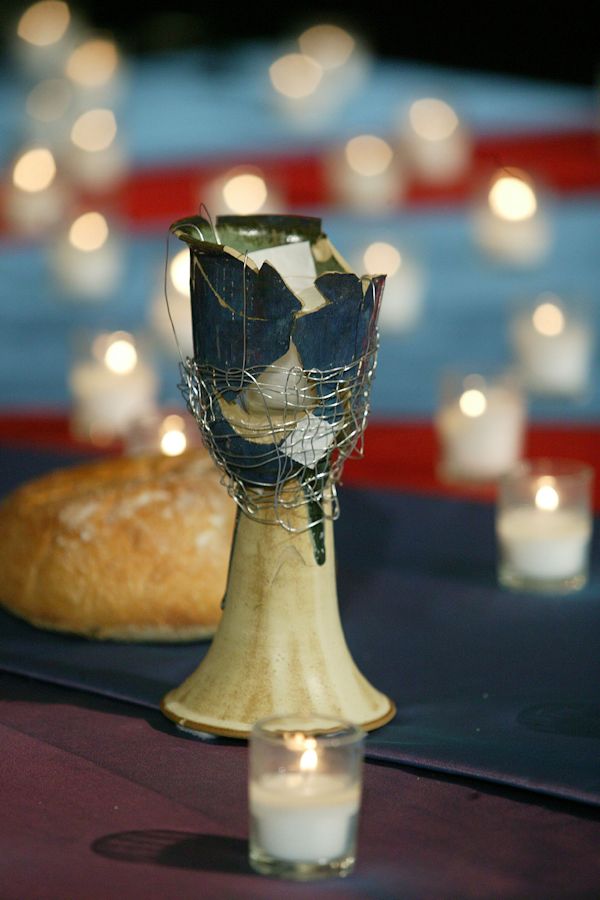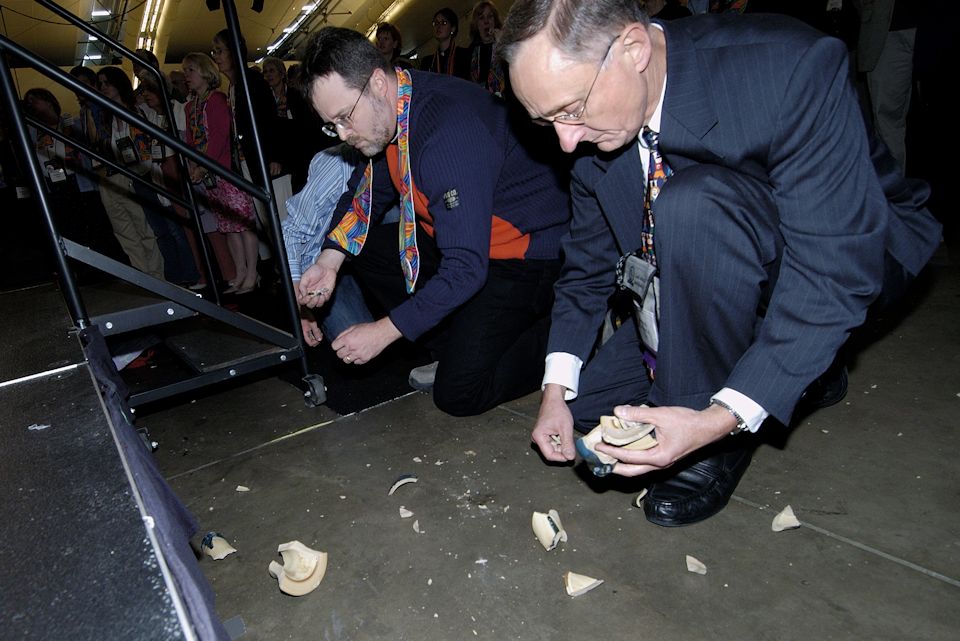Rev. Paul Perez remembers picking up pieces of a broken chalice at the 2004 General Conference. Pittsburgh’s memories inform his thoughts on the “breaking point” The United Methodist Church has arrived at today.
PAUL PEREZ
Director of Connectional Ministry, Michigan Conference
17 years ago, I found myself picking up the pieces of a shattered communion chalice from the floor of a convention center in Pittsburgh. It was the 2004 General Conference. Every time there is news about the General Church, like the recent further delay of General Conference and the calling of a Special Session, I return to this moment. In many ways, “picking up the pieces” has defined my entire professional ministry in The United Methodist Church.
I was a lay delegate of the Detroit Conference, 22-years-old with one year of seminary under my belt. I spent six long days in a windowless convention center room as a Church and Society legislative committee member. I was on the Human Sexuality subcommittee. Comprised of people from across the theological spectrum of varying races, nationalities, and sexual orientations, we argued, laughed, cried, and emerged from our work with a modest compromise that, for me, allowed a more honest statement of the denomination’s conflicting understandings of human sexuality.
When our legislation work came to the plenary floor, it was challenged by a “minority report” led by the traditionalist members of our subcommittee. The minority report, which maintained and slightly strengthened the Book of Discipline’s “incompatibility” language, won the day. The long hours our committee spent conferring came to naught. Hope for even a modest compromise dashed. I felt angry, betrayed, naïve. Some of my idealism for the Church was shattered that day. Some of my institutional cynicism took its place. From my seat on the convention center floor, I craned my neck, scanning the bleachers surrounding the bar looking for my friends who I knew would be hurt and heartbroken by the vote.

After the plenary session was released and delegates filed out for cookies and coffee, I joined a group clad in rainbow stools gathered around the main stage and altar for a service of grief and lament. I prayed. I wept. At the end of the service, a member of the group climbed on the stage, took the ceramic communion chalice resting on the altar, lifted it up, cried out words I barely heard and no longer remember, and threw the cup to the ground. It shattered.
The group dispersed. I lingered. I found myself on my knees with Chip Aldridge, the Admissions Director at Wesley Theological Seminary, and Bishop Don Ott, former Bishop of the Michigan Area. The three of us slowly and silently collected the pieces of the broken chalice. Placing the shards in our hands and carrying them to the altar.
In the remaining days of the General Conference, much was made of this broken cup. The worship leader reported that it had been a personal gift with great sentimental value. The cup, reassembled and held together by a jagged superstructure of wire, returned to the altar. It became somewhat of a symbol for the 2004 General Conference.
We United Methodists again find ourselves at a breaking point. There is pain and hurt to go around. I have no doubt we, as a denomination, are at a parting of the ways. Colleagues, friends, and even family members will find themselves in separate Methodisms. People I know well and care about will join the Global Methodist Church and the Liberation Methodist Connexion.
While painful, it is time.
My hope is we will be able to mutually bless each other as we head in different directions. I hope we might forge formal ecumenical relationships and find in the midst of ecumenical dialogue as denominational cousins the conversations we never allowed ourselves to have as siblings living under the same roof. I also hope that in a generation or two, we might contemplate receiving, again, God’s gift of Christian unity.
I am committed in my role as Director of Connectional Ministry to make these hopes reality.
I also have great hope for the United Methodist Church in Michigan. In 2019, we began charting a course for a more “faithful, just, and equitable” Conference focused on ministry “with vulnerable communities across the State and around the world” (GCR#2019-2, “Aspirations for the Michigan Conference”).
In November 2020, our Conference Leadership Council affirmed a Strategy Task Force’s work convened by Bishop David Bard. It honestly named missional and connectional challenges the church faces moving into the third decade of the 21st century, including the twin pandemics of COVID-19 and racism and our denominational impasse. It identified four pressing strategic foci: Sharing God’s Love, Building the Beloved Community, Developing Leaders, and Financial Sustainability. It placed at the center of these foci both renewed congregations and creative ministry with young people, Black, Indigenous, People of Color, and LBGTQIA communities in Michigan, all informed by soul searching anti-bias and anti-racism work. The work of the task force is just a beginning. It will continue and take new shape and form in the coming months.
I am also committed in my role as Director of Connectional Ministry to make these hopes reality.
Sometimes when I am on my knees in prayer, I find myself remembering that convention center. I see ceramic shards in my hand. Picking up the pieces and placing them before God is sacred work. Is this not the invitation of the Lenten journey toward Easter? To both honestly acknowledge the messy challenges and hold them in open-handed hope. It may not be the work any of us sought, but it is the work we are called to do in so many ways in the broken world we inhabit. It is work that cannot be done alone. I hope you will join me in the sacred work before us.
Last Updated on October 31, 2023

